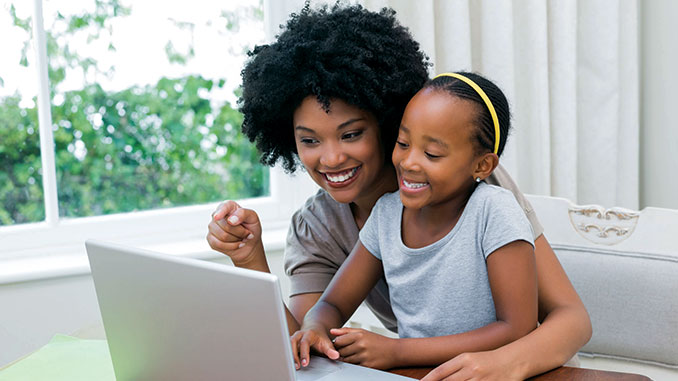
Regular routines and social interactions are important as families navigate today’s uncharted waters.
Published: August 26, 2020
By: Tanni Haas
There’s nothing easy about parenting in a pandemic. Many parents are working from home while at the same time taking care of their kids and supervising their remote learning. No one knows when the pandemic will be over, so it’s worth thinking about how parents can best support their kids during these new and unprecedented circumstances. Here’s what the experts say:
Keep Your Regular Routines. The most important thing parents can do is to provide their kids with a sense of safety and security. Experts agree that the best way to do that is to keep as many of their regular routines as possible. “Providing children with a structure is always important,” says Dr. Andrea Giedinghagen, a child psychiatrist, “but during scary times like this it becomes even more essential.” Dr. Giedinghagen notes that “having a set schedule and regular routines provides them with a sense of safety when so much about their world is changing.” Try to maintain your normal routines, especially those that bring you together, like family dinner time, and game or movie nights.
… And Create New Fun Ones. Create new routines like taking daily breaks from your work to do fun things together. As Dr. Jennifer Malatras, a child psychologist, puts it, “a moment of laughter with your kids is going to be much more impactful and remembered during these times than any math homework.” If the kids are young, get down on the floor and play with them. If they’re older, spend some time just hanging out and talking about what’s on their minds. “Taking a kind and playful approach to these difficult times,” says Dr. Irina Sharaievska, a family researcher, “can help ensure that two years from now you’ll refer to this time not as a pandemic, but as a time when you finally got to know your family.”
Encourage Social Interactions With Friends. It may be tempting to insist that your kids be offline during their breaks since they spend so much of their days behind a computer screen, but that’s not necessarily the best idea. One of the things that kids miss the most from their regular school day is the opportunity to interact socially with classmates. Now that they’re at home, let them keep in touch by calling and texting their friends and engaging with them through social media. As Dr. Chelsea Hyde, an educational psychologist, says, “give them a chance to connect with peers during their breaks, like they would during recess and lunch at school.”
Be Flexible and Adaptable. Routines and social breaks are important, but so is staying flexible and adaptable. A structured day “helps kids get through the unusual challenges of this time,” says Annie Schiener, a family therapist, but “your flexibility models an essential coping tool.” For example, if you receive an important work email in the evening just when you’re about to do something fun with the kids, explain to them that you may have to reschedule it. This will teach them to be flexible and adaptable and may in fact help them cope better with all the constant changes in their lives.
Focus on Positive Behaviors. There’s a tendency to nit-pick and focus on irritating or annoying things that your kids are doing when you’re all cooped up in the house together: try to avoid that. “What seems like annoying behavior may sometimes be your child’s way of coping,” says Dr. Richa Bhatia, a child psychiatrist, “and is often unintentional.” For example, if the kids are teasing each other, it could be a sign that they’re frustrated and miss their regular interactions with friends from school.
Focus on positive behavior and praise them for it, like getting up early every day, working hard on their schoolwork, and helping out with chores. “Praising your kids and letting them know you appreciate their effort,” say Drs. Leslie Roos and Jessica Flannery, clinical psychologists, “pays over time by promoting more positive behavior and enriching your relationships.”
Give Lots of Hugs. Everyone feels the effects of social isolation, especially the kids. Comfort them by giving them as many hugs as you can. “When everything is crazy on the outside,” says Rebecca Parlakian of Zero to Three, an organization that promotes healthy child development, “children need love on the inside.” Dr. Giedinghagen agrees: “Physical affection cements feelings of connection and safety for children.”
Teach The Kids Life Skills. “Every cloud has a silver lining” is an old saying. The current pandemic is no exception. Use this extra time you suddenly have with the kids to teach them some important life skills. Look for teachable moments during your everyday routine. “Do you need to make dinner? Teach your kids how to cook,” says Dr. Gwen Dewar, a psychologist. “Got dirty clothes? Teach your kids how to do the laundry.”
Be Gentle With Yourself. Finally, be gentle with and don’t put too much pressure on yourself. As Dr. Giedinghagen sagely puts it, “give yourself permission to do this less-than-perfectly, and to ask for help when you need it. None of us have ever parented through a pandemic before, and none of us have ever been taught how to do it.”
Tanni Haas, Ph.D., is a Professor in the Department of Communication Arts, Sciences & Disorders at the City University of New York – Brooklyn College.
